- 481
- 248
- 43
- Location
- Qualicum Beach BC
It doesnt look like Teddy is having a fun ride tho...he can sing the high harmonies to " on the road again" when its time.
Steel Soldiers now has a few new forums, read more about it at: New Munitions Forums!


Your M207 would like to identify as an M211 lol? I think the reason we say the M207 CDN is more rare than the M211 CDN is only because we haven't seen many M207's remaining. The 207 were cab and chassis / dual, so likely more versatile in the after market auction houses of Crown Assets. We know the 207 carried shelters similar to the American M220. They could have been beat to death or just good keepers we're just seeing leak out now.
Interestingly enough, It does appear that production lines produced multiple models at the same time. By 1954, M211 CDN production numbers were just slightly higher than M207 at 109.3 trucks per month and 3,170 M211 units being produced by 11-6-54.
You do have another mystery we should or maybe shouldn't talk about. If this is a secret location for an engine kill switch we won't say anything but it's in an odd spot. Once you get around to electrical you'll find out what this is hiding down here. It's a weird spot for a heater switch too so something's up with that.
View attachment 937474
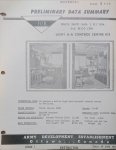

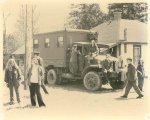


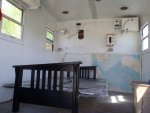

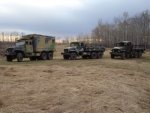
The frame number and the first four digits are most certainly 1207 and you're sitting on some history....slide bar hood and all. That bell says communication shack, Kratz, Light A-A anti-aircraft truck, or maybe the dentist. Most pics compliments from DM and the boys at CMV.
View attachment 937476View attachment 937480View attachment 937481View attachment 937477View attachment 937478
We can just see the button on the back wall in this truck which was M207 with blackout curtain mods, likely an A-A truck and not a Gin Palace. Apparently Service Members have been known to call these trucks the Gin Palace.
View attachment 937483
Fortunately the M207 Pole trucks don't appear to have a bell. These units must have worked the most and carried the heaviest loads. The bell was likely part of the 'Shop Van' installation and the two we've seen were from the 303 Workshop in Quebec.
View attachment 937482
From left to right that's CDN M207, M211 and the sassy M135. Can't blame folks for thinking the M207 is an M220 or M211 with the box off. The secret is in that frame number.
View attachment 937479
My truck has an angle iron rectangular frame welded to the bumper in the same location as the 207dent picThe frame number and the first four digits are most certainly 1207 and you're sitting on some history....slide bar hood and all. That bell says communication shack, Kratz, Light A-A anti-aircraft truck, or maybe the dentist. Most pics compliments from DM and the boys at CMV.
View attachment 937476View attachment 937480View attachment 937481View attachment 937477View attachment 937478
We can just see the button on the back wall in this truck which was M207 with blackout curtain mods, likely an A-A truck and not a Gin Palace. Apparently Service Members have been known to call these trucks the Gin Palace.
View attachment 937483
Fortunately the M207 Pole trucks don't appear to have a bell. These units must have worked the most and carried the heaviest loads. The bell was likely part of the 'Shop Van' installation and the two we've seen were from the 303 Workshop in Quebec.
View attachment 937482
From left to right that's CDN M207, M211 and the sassy M135. Can't blame folks for thinking the M207 is an M220 or M211 with the box off. The secret is in that frame number.
View attachment 937479


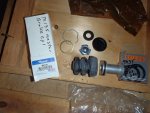
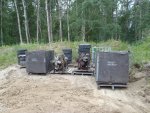
Going to a larger internal bore size will give you more braking power. It will also use more fluid and will require a larger master cylinder. Besides that, I believe it is a good modification. On the later M35 deuces many have converted to a larger wheel cylinder and have no problems. I planned to do this to my Deuce when I do my next brake job.Ok so in looking for wheel cylinders i came across these. The 15306 is the 1 3/8" bore from the parts list. The 15307 is a 1 1/2" bore unit from the big book of raybestos.
Externally it apprears identical. The only difference is the pushrod length looks like the 15307 shipped with ones that are about 1/4" longer and no copper washers( thanks raybestos/china).
My question is,
How much effect is there going from 1 1/4 to 1 3/8 on braking performance/sensitivity and driveabillity?
I have a system mod in mine for my trucks so ill be able to compensate for the extra volume/pedal travel.
My thinking is that a person could run them at 1.5". Then if they experience issues it would be relatively easy to sleeve them back to 1 1/4 or 1 3/8 without boring.
What are your thoughts?
I have driven an M135 with the 1 1/4 bore cylinders and an M211 with the 1 3/8 Canadian upgrade. Both worked very well with stock master cylinder and I honestly couldn't tell a lot of difference. I drove the M211 that had the 1 3/8 wheel cylinders from Big Timber, MT to Bozeman and back, as well as in a parade and there were no issues at all.My question is,
How much effect is there going from 1 1/4 to 1 3/8 on braking performance/sensitivity and driveabillity?
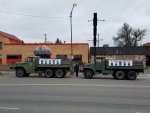
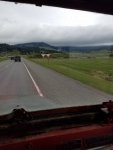
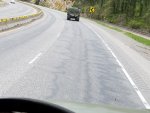
This is also my understanding and the reason we put the 15306 part number in the parts list.So far we're finding the CDN trucks had upgrades from factory and 1 3/8" wheel cylinder was standard. I say 'so far' because we never say never and might find 1 1/4" in a CDN truck one day. It appears, most likely, possibly, many American G749 threads report 1 1/4" wheel cylinders so it could be, in general, its a CDN thing.
I thought you said you where going to use a 1-1/2" wheel cylinder. On six wheels that is quite a bit more fluid.I have driven an M135 with the 1 1/4 bore cylinders and an M211 with the 1 3/8 Canadian upgrade. Both worked very well with stock master cylinder and I honestly couldn't tell a lot of difference. I drove the M211 that had the 1 3/8 wheel cylinders from Big Timber, MT to Bozeman and back, as well as in a parade and there were no issues at all.
Both of these trucks also had the airpak rebuilt with the 5 ton kit and "power piston" as shown in the airpak rebuild sticky. I'm not sure if that affected anything to where I couldn't tell a difference between the two kinds of wheel cylinders.
View attachment 937496View attachment 937497View attachment 937498
This is also my understanding and the reason we put the 15306 part number in the parts list.
Yes the 15307 is a 1 1/2" bore. I know they will require more volume. My question was about the change in dynamic braking effect. Ive read that the 1 3/8 were harder to modulate than the 1 1/4. But i have no first hand experience so i figured id ask the experts.I thought you said you where going to use a 1-1/2" wheel cylinder. On six wheels that is quite a bit more fluid.
We want lots of pictures and a "how to" on this!!Planning on mounting a full air foot valve, and using it to control 1 air brake service chamber for the front axle pushing its own master, and 2 piggy back chambers for the middle and rear axles with their own masters. (Emergency use, not parking on their own). Itll be a lot of work but should be well worth it.
You know you could use the brake master cylinders used in the M105 trailers.Yes the 15307 is a 1 1/2" bore. I know they will require more volume. My question was about the change in dynamic braking effect. Ive read that the 1 3/8 were harder to modulate than the 1 1/4. But i have no first hand experience so i figured id ask the experts.
I want to split the system. Planning on mounting a full air foot valve, and using it to control 1 air brake service chamber for the front axle pushing its own master, and 2 piggy back chambers for the middle and rear axles with their own masters. (Emergency use, not parking on their own). Itll be a lot of work but should be well worth it.
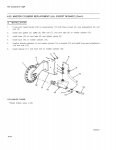
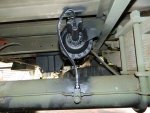
You bet, A relay valve is part of the puzzle.You know you could use the brake master cylinders used in the M105 trailers.
View attachment 937583View attachment 937584
The only problem I see with your idea is the lag time you will have from first applying the foot valve until the brakes are actually applied.
You will also experience different apply times between the three brake master cylinders.
Big rigs (Semi-Trucks) which use air brakes get by this lag time by using small hoses from the foot valve to relay valves which control air tanks placed along the truck. The small hoses allow air to quickly reach the relay valves which in turn use air stored in the air tanks to apply the brakes.
You know you could use the brake master cylinders used in the M105 trailers.
View attachment 937583View attachment 937584
The only problem I see with your idea is the lag time you will have from first applying the foot valve until the brakes are actually applied.
You will also experience different apply times between the three brake master cylinders.
Big rigs (Semi-Trucks) which use air brakes get by this lag time by using small hoses from the foot valve to relay valves which control air tanks placed along the truck. The small hoses allow air to quickly reach the relay valves which in turn use air stored in the air tanks to apply the brakes.
We get it, advertisements are annoying!
Sure, ad-blocking software does a great job at blocking ads, but it also blocks useful features of our website like our supporting vendors. Their ads help keep Steel Soldiers going. Please consider disabling your ad blockers for the site. Thanks!

